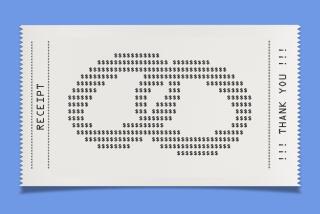You spent how much? On what?
- Share via
One of the wonders of matrimony is that two people who’ve worked out how to live together, plan together, socialize, entertain, deal with neighbors, children, schools, in-laws, pets, work stress and holidays can still go to war -- the screaming kind, with casualties -- over the price of a bottle of table wine. As in: “Excuse me, did you say thirty dollars?”
Money has turned husband against wife since accounts were tallied on stone walls, since doubloons were buried under the old oak tree. But only recently have psychologists and economists discovered good evidence to explain why. They have found striking gender differences in what men and women see in a pile of change or an online account, and have started to articulate how personality and upbringing can amplify those differences to passionate disputes.
For psychologically speaking, cash is indeed cold, an emotionally neutral, blank screen onto which each person projects his or her anxieties, expectations and biases.
“Those associations are strong, and usually different between a husband and wife,” said James Gottfurcht, a Los Angeles-based psychologist who specializes in money issues. “And what makes it especially difficult is that we’re often not fully conscious of what we think ourselves about money, and why.”
At the most basic level, couples don’t even agree on what they have in the bank. In a recent study, economist Jay Zagorsky of Ohio State University analyzed interviews with about 1,200 married couples tracked for 30 years. He found that a typical husband reports 10% more household income than his wife does. She typically reports $500 more in shared debt than he. Both husbands and wives underestimated what their partner earned yearly (when both worked outside the house) by more than $3,000.
“These are large differences and very surprising,” Zagorsky said. “These were people who’d been living together for years, in long-term relationships.”
It wasn’t evident from the data who was more accurate in their estimate; yet earlier work by Zagorsky showed that most people underestimate their personal worth, suggesting that husbands were closer to the mark. “Right off the bat, you can see that if the man feels the family is doing well, and the wife is concerned about debts, and he goes out and buys a new boat.... Guess who’s going to be arguing about money?”
Zagorsky found evidence that some traditional gender differences vis a vis money had broken down in recent decades; in 60% of one group of couples he analyzed, it was the woman who managed the household books. Nonetheless, psychologists say some stereotypes still hold. As a rule, women are more worried about economic security, for instance, and men are more apt to gamble the savings for a bigger payday. Men also are more likely than their wives to see income as an expression of their personal character and self-worth.
But the kinds of passionate beliefs about money that lead to resentment and distrust are rooted in each individual’s early family life. Gottfurcht recently consulted with a couple, a small businessman and his wife, an entertainment executive who made much more money. The husband wanted to invest $50,000 of her savings to expand his business. She balked. He was incredulous: My own wife doesn’t believe in me.
“He was a good businessman, he had a very good plan, he wanted a loan and he was just raging about it, questioning the marriage,” Gottfurcht said.
It took some work in counseling sessions for Gottfurcht to learn that the wife had grown up with a father who’d blown through the family savings more than once. “She was determined not to let any other person, especially a man, bleed her nest egg,” he said.
Consciously, she had never connected her early experience with her current dispute. Once that was in the open, her husband saw that the denial wasn’t personal, and the pair negotiated a compromise, a loan for half the original $50,000.
Differences about money often ambush newlyweds and younger couples. Shane Fookes, 36, a project manager in Little Rock, Ark., recalls the first time he and his wife, Aimee, 33, went on vacation.
“Little did we realize how vastly different our understanding was of the meaning of vacation,” he wrote in an e-mail. “I grew up with a father who tried to go as far as he could on vacation before running out of money. We went to some incredible locales while staying at budget hotels, eating with coupons and cutting whatever other corners were needed. Aimee’s father, on the other hand, thought of vacations as the time when you broke all the spending rules and ‘lived large.’ We experienced this clash of cultures on the first day with the first meal stop (fast food) and hotel (roadside motel). My still-new bride was in tears.”
One reason they’re still married after 13 years and four children is that he’s learned to open his wallet a little more. She has accepted that when it comes to her husband, a cheap dinner out is not a reflection of romantic indifference.
It’s when couples use money as a weapon that their marriage is most in jeopardy, psychologists and counselors say. Because it’s so strongly associated with power and control within a relationship, money affords ample opportunity to express resentment or anger. The husband who saves every dime may be consciously or unconsciously starving a relationship he’s not satisfied with. Likewise, a $2,000 Nordstrom tab can be a calculated bomb.
“Excessive spending might be a sign of passive-aggressive behavior, where one spouse is ‘out to get’ the other or prove a point, simply because he or she can’t surface anger any other constructive way,” said Loriann Hoff Oberlin, author of “Surviving Separation and Divorce” (Adams Business Media, 2000), in an e-mail. “Also, how many times do we hear of women learning of affairs, only to discover a paper trail of deception, secret spending, lavish gifts for one’s paramour or worse yet, spending on seedier items like porn or escort services?”
Which goes to show you can buy misery, if not happiness.
If a recent study is any guide, finding that elusive condition -- happiness -- in any marriage might have less to do with money than some couples sweating a mortgage might assume. In an analysis of interviews with 1,500 men and women, tracked for 28 years, USC economists reported last month that couples were not any happier as they acquired more wealth. The bills were easier to pay, the cash flow less a cause of anxiety, perhaps. But it was good health and time spent with family that most warmed people’s hearts. In the absence of crisis or poverty, in short, family harmony trumps Franklins.
Which is all the more reason to quit bickering over the $30 bottle of wine -- and pop the cork.
More to Read
Sign up for Essential California
The most important California stories and recommendations in your inbox every morning.
You may occasionally receive promotional content from the Los Angeles Times.













